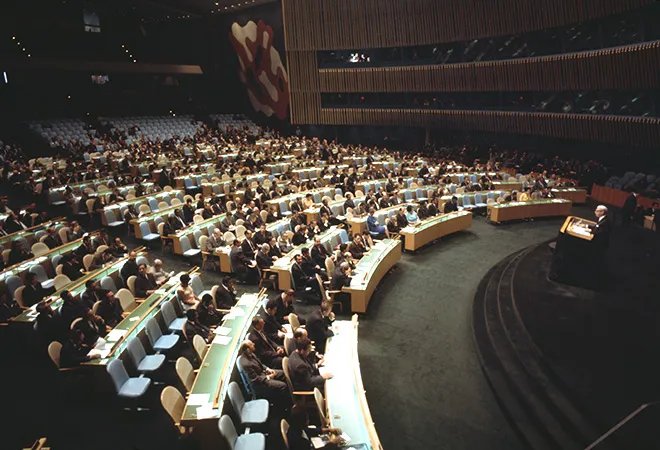-
CENTRES
Progammes & Centres
Location
All permanent five would benefit from a conversation on additional permanent seats as no member of the Security Council can gain any long-term economic or political benefit through a world in disarray.

The United Nations had probably hoped for different circumstances to celebrate their anniversary. However, it so happens that UN 75 coincides with the world’s most severe pandemic in a hundred years as well as a far-reaching trade war. Such global developments have made the problems the UN Security Council currently faces more visible than ever before. Yet, identifying and addressing the deep-rooted structural concerns of the Security Council requires to trace its historic purpose and carefully ponder risks related with prospective decisions on future reforms. With up to 85 million deaths in World War II, the winning powers agreed that another global war as well as committed crimes against humanity should never happen again. To bring sustainable peace and stability to the world, the United Nations (UN) were created as heart of a new global security order. In contrast to the former League of Nations, the UN’s institutional resilience was rooted in the United States’ support to create a liberal rules-based order which was essential in setting up the United Nations. It seemed obvious that other major powers would only subscribe to the cause if their voices were not overheard in the continuous buzz of 51 states: the new Security Council had to recognise their interests as well. In strong contrast to the General Assembly’s embodiment of One Country, One Vote — the Security Council became the UN’s body producing rapid responses to international insecurity.
"Identifying and addressing the deep-rooted structural concerns of the Security Council requires to trace its historic purpose and carefully ponder risks related with prospective decisions on future reforms."
For that reason, any of the now fifteen UN Security Council members were able to call for a prompt and effective response to global security concerns through passing resolutions. As a reflection of its era’s realpolitik, creators of the UN Charter agreed on China, France, Great Britain, the US, and the Soviet Union as the carriers of never-expiring membership in the most significant body of global governance while the other ten members were to be elected by the General Assembly. Since the system was set up in 1945, two important changes took place: the Chinese Civil War which led to a transfer of membership from the Republic of China to the People’s Republic of China and the breakup of the Soviet Union providing the Russian Federation with that permanent membership. While the permanent five countries did gain the right to veto, the elected members kept the potential power of building a majority. Hence, the P5 and E10 can only accept resolutions if they effectively cooperate. In the post-World War II order, the UN Security Council failed in preventing conflict in general but facilitated new red lines great powers respected.
Even though the ongoing COVID-19 pandemic has been unfolding several structural deficits and internal lines of division within the Security Council, some of these can even be traced to the 1950s. Back then, the Cold War forced the world into alliances. Even states like India, Egypt, and Yugoslavia, who did not want to enter an alliance, had to actively construct a platform to be recognised as non-aligned. For the systemic rivals of the Cold War, mutual trust was a scarce resource and cooperation remained limited to key challenges of international security. Legal norms and principles facilitated mutual deterrence and expectations. This has changed. With China not being member of many international treatise such as the Limited Test Ban Treaty (LTBT) as well as Russia and the United States criticising and partially even discarding weaponry control regimes, the Security Council has lost its ability to declare the dos and don’ts of state behaviour. In line with the rise of nationalist politics around the world, the Security Council is now increasingly viewed as a tool for domestic preferences. The rise of nationalism around the world is paralleled by a decline of liberal democratic values and a rise of transactional politics is fueling weaponised interdependence. This is particularly visible in relatively new policy areas as for example cyber and space that have been and remain mostly unregulated. Questioning the UN’s overall mission and meaningfulness, the US President helps to simultaneously delegitimise the Security Council.
"The dilemma the UN faces becomes more visible when taking a broader look at the United Nations: with the securitisation of human suffering, finding a joint response to COVID-19 or the conflict in Syria has become impossible."
Not only Donald Trump, but all state leaders currently need to reassess their position in a world that is now exiting the post-Cold War era. In the past thirty years, Francis Fukuyama’s promise of the end of history perpetually resonated in the ears of many western government officials, as their political leaders felt the moment for stronger global governance and realisation of human rights had finally come. With the Security Council’s 1990 decision to sanction Iraq for invading Kuwait, the body foreshadowed its more humanitarian approach which it wanted to implement from now on. Witnessing the UN’s incapacity to find a coordinated response towards genocides in Rwanda and Serbia, new norms such as the Responsibility to Protect (R2P) were created. The new policy was a success in the eyes of everyone who desired the international community to be a global watchdog for human rights violations. Others viewed it as overstepping the Security Council’s competences. This became visible when China declared its opposition to make climate change a part of the Security Council’s portfolio. Even if the matter involved a security dimension, efforts to shaping a more holistic idea of security came to a pause. Countries like China argued there would be specific committees to deal with such topics. Yet, the dilemma the UN faces becomes more visible when taking a broader look at the United Nations: with the securitisation of human suffering, finding a joint response to COVID-19 or the conflict in Syria has become impossible. Similarly, it took Michelle Bachelet, the UN Undersecretary for Human Rights, almost one month to issue a statement on the injustices currently taking place in Belarus. The failure in addressing the most pressing security concerns of today both in the Security Council and the Human Rights Sub-Committee signals unprecedented loss of ability of our multilateral institutions. While the 2030 Agenda for Sustainable Development showcases that the United Nations is able to rethink content, its structural reform ideas all fizzled out over time.
The Security Council has not successfully been involved in past reforms. Yes, one could argue that resolutions such as 2250 and 2419 show the Security Council’s overall new understanding of peace and security in line with the agenda of the United Nations. However, the multiplication of resolutions since the end of the Cold War did not stipulate a new purpose but reveal the Security Council’s new hybridity judging about global and local issues. Finding common solutions has not become easier. Deadlocked conflicts such as the mentioned war in Syria have already put on display some of the consequences a dysfunctional Security Council might have. Carving out a clearer division of labor between UN institutions, the Security Council must continue to implement resolutions in-line with the overall UN agenda, but also needs a stronger mandate for its core responsibilities. One way to allow for such developments would be the installation of an automatic referral process within the United Nations that would pick up on vetoed resolutions and be able to bring those back into the legal process.
"By involving strong new permanent voices from Latin America and Asia in the Security Council, the body would increase representation and effectively counteract the perception of a bipolar world."
Against common belief, all permanent five would benefit from a conversation on additional permanent seats as no member of the Security Council can gain any long-term economic or political benefit through a world in disarray. By involving strong new permanent voices from Latin America and Asia in the Security Council, the body would increase representation and effectively counteract the perception of a bipolar world. As China and Russia have perceived themselves as being above international law in recent years, these very actions would face much stronger and global condemnation resulting in much higher costs. Russia’s behavior on the Crimean Peninsula as well as China’s Hong Kong policy have undermined the Security Council’s authority to condemn breaches of international law.
Overcoming the challenges, the Security Council currently faces, requires overcoming the trend of transactional politics. The suggestions outlined here can only succeed within a larger reform agenda and if nations reject transactionalism. Its reform must be understood as long-term investment into the security of international politics and the Security Council must be seen within its wider institutional framework. Only then, the Security Council will remain recognised as indispensable and trusted as legitimate guardian of international peace and security for the next 75 years.
The views expressed above belong to the author(s). ORF research and analyses now available on Telegram! Click here to access our curated content — blogs, longforms and interviews.

Tobias Scholz is an Associate at the German Institute of International and Security Affairs. ...
Read More +